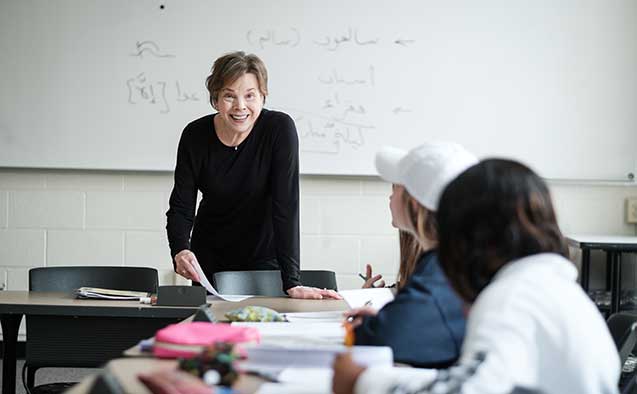WFU professor Linda Nielsen on myths about fathers
Her new book focuses on damaging stereotypes about dads

As Father’s Day nears, families across the country are finding ways to celebrate their dad. It’s also a time to reflect on the importance of these relationships and the impact that they have on a child’s development and well-being.
“Kids whose dads are highly involved in their care (including during infancy) have better outcomes than kids with less involved dads – emotional, behavior, mental health and academic,” said Linda Nielsen, professor of adolescent and educational psychology at Wake Forest University.
For more than 30 years, Nielsen has taught the only known college class in the U.S. devoted exclusively to father-daughter relationships. Her research has established her as one of the world’s foremost experts on the topic and a recognized expert on shared physical custody for children of divorce. Her work has influenced child custody law reform in the U.S. and abroad.
In her latest book, Myths & Lies About Dads: How They Hurt Us All, she assesses more than 100 of the most damaging beliefs about fathers and how these stereotypes lead to negative consequences for families and communities.
Your new book talks about myths and lies about dads. Why did you write it?
People have many false beliefs and negative stereotypes about men as parents. And when we have false beliefs and negative stereotypes about any group of people, it affects how we interact with them, the laws we make that affect them and it limits their choices and freedoms.
How so? What are some of the most harmful myths?
If you believe men are inferior to women when it comes to taking care of infants or bonding with their newborns, or if you belief that babies automatically form a stronger and more important emotional bond to their moms than to their dads, then you might not believe paternity leaves are as important as maternity leaves – and your company’s policies and national laws will give men less freedom to be with their babies. Neither of those two things is true: babies do not form an emotional bond to either parent until about six months of age – and that emotional bond is equally strong with dads.
As Father’s Day is approaching, what are some of the things that concern you most about fathers in our country today?
We keep promoting false beliefs about dads – we’re not making the same kind of progress we made in destroying false beliefs about women (STEM jobs, for example). Those beliefs deprive children of the kind of fathering time they need and deserve. We need to stop promoting the false belief that men don’t do their fair share of the work in raising children.
Twenty years ago, you would find baby changing diaper tables only in women’s restrooms. Nowadays, there are more in gender neutral areas or both sets of bathrooms. Until you get rid of these myths, you won’t change policies that impact fathers.
Based on your research, what changes in society would strengthen fathers’ relationships with their kids?
(1) Paternity leaves for dads. (2) Custody laws that give dads 50 percent of the parenting time. (3) Encourage and welcome men into jobs that are more family-friendly.
What are three things dads and daughters could consider doing to create more meaningful relationships?
(1) Spend one on one time with each other (phone calls) without including any other family members. (2) Talk about personal, meaningful topics. For example, daughters: ask your dad about his life before he became a dad. Dads: share more about your past with your daughter, including mistakes you made when you were her age. (3) Don’t make assumptions about one another’s beliefs or how you’re going to react in particular situations. Talk more openly and honestly and listen more carefully.
Nielsen recently received a lifetime achievement award from the National Parents Organization.
Her research has been featured in a PBS documentary, as well as on National Public Radio, the BBC, Time, Wall Street Journal, New York Times, and Washington Post. Her sixth book, Myths & Lies About Dads: How They Hurt Us All, was recently published by Routledge
For more information about Nielsen’s work, visit her website.
A Kirkus review of her new book can be found here.
Media Note: To schedule an interview with Nielsen, email media@wfu.edu.
Categories: Top Stories
Wake Forest News
336.758.5237
media@wfu.edu
Meet the News Team
Headlines
Wake Forest in the News
Wake Forest regularly appears in media outlets around the world.




